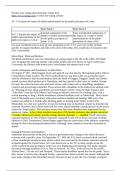Practice your typing speed and share results here:
https://www.typing.com/ or other free typing website
AC 1.5 Explain the impact of media representation on the public perception of crime
Mark Band 1 Mark Band 2
Limited explanation of the Clear and detailed explanation of
AC1.5 Explain the impact of
impact of media representations the impact of a range of media
media representations on the
on the public perception of representations on the public
public perception of crime
crime. (1-3) perception of crime. (4-6)
Use your workbook notes to type up your paragraphs on AC 1.5 in your own words. Include
specific newspaper headlines and links to the role of the media. This would take 35 minutes in the
Unit 1 assessment.
Moral Panic: Mods and Rockers
The Mods and Rockers were two subcultures of young people in the UK in the 1960s. The Mods
were recognised by dressing smartly, with parker jackets and were known to enjoy modern jazz.
Conversely, the Rockers rode motorcycles, wore leather and enjoyed rock n roll.
Levels of Response and Punishment: London Riots
On August 4th 2011, Mark Duggan, black and aged 29 was shot dead by Metropolitan police officers
in Tottenham, North London. The 2011 London Riots rose out from what was a peaceful march
with the intention to find out information about the death of Duggan. Duggan's family and friends
started a protest which picked up in Tottenham; and then spread to other areas in London. During
the riots, the crimes became more and more serious with crimes such as shoplifting, vandalism,
violence and arson being committed. These actions led to headlines in the media from tabloids such
as: “Flaming morons, thugs and thieves terrorise Britain's streets” from the Daily Express, and
“Yobs Rule” from the Daily Mirror ('yob' being an offensive term for the working class, with a
similar meaning to 'thug'). Whilst broadsheets released headlines such as 'Mobs Rule'. Due to these
riots, 2158 people were convicted, with prison sentences handed out totalling 1800 years. One
student was jailed for 6 months after pleading guilty to stealing water bottles worth £3.50.
Meanwhile, two men were jailed for 4 years for inciting riots on Facebook, despite no disorder had
occurred. However, due to these harsh and, for some, unjust headlines caused pressure on the justice
system for 'tough justice'. This pressure meant some first-time offenders were imprisoned for the
pettiest of crimes. In fact, those involved were given 25% harsher sentences than people convicted
of similar offences previously; and the average amount of people ----- doubled. Youth courts gave
custodial sentences to 32% of those convicted, compared to only 5% of those convicted of similar
offences in 2010. Furthermore, Simon Rogers argued that the convictions of the offences committed
during the riots were disproportionality harsh. Although, many sentences were then shortened on
appeal.
Changing Priorities and Emphasis
Sometimes the priorities of the police forces or government may change as the media discusses
concerns with a specific crime. On September 11th, 2001 the 9/11 attack occurred which consisted
of four coordinated suicide terrorist attacks which were executed by the Islamic extremist network
al-Qaeda against the United States. 9/11 was shown live on the TV, so many people across the
world watched the attacks happen, which was very frightening and shocking. The media reported
the attacks through headlines such as: 'War on America', 'It's War', 'Is this the end of the world?',
'Darkest hour', 'US saw evil' and 'Bastards'. These intense headlines spread fear for the public. Since
then, norms in society have changed. Firstly, a general fear about terrorism has spread. Although the
most major change is the intensified security measures in day-to-day life. For example, at airports




